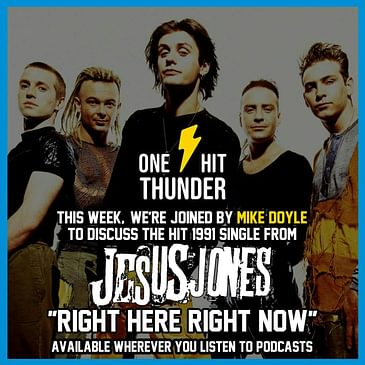If you were putting together an informercial for a compilation of ‘90s hits, it’s almost certain that a clip of Jesus Jones “Right Here Right Now” would snag a good 8 second chunk of it. This incredibly optimistic alternative rock anthem captured the essence of revolutionary change in Europe and beyond, just a few months before the rise of grunge music made apathy seem decidedly cooler. Joining us this week is Mike Doyle, bassist for Lanemeyer and host of the podcast This Was The Scene, and together we dive into the enduring impact of this widely acclaimed hit.
One Hit Thunder is brought to you by DistroKid, the ultimate partner for taking your music to the next level. Our listeners get 30% off your first YEAR with DistroKid by signing up at http://distrokid.com/vip/onehitthunder
Learn more about your ad choices. Visit megaphone.fm/adchoices


